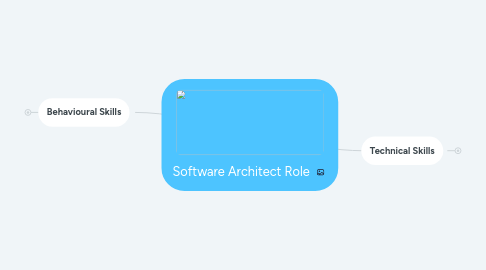
1. Behavioural Skills
1.1. communication skills
1.1.1. verbal
1.1.2. written
1.1.3. presentational
1.1.3.1. educate and convince stakeholders
1.1.3.2. adjust to the audience
1.2. seek committment
1.2.1. stakeholders
1.2.2. team
1.3. follow industry trends, applicability to product/project/long term
1.3.1. new methodologies
1.3.2. technologies
1.3.3. interact with other architect peers
1.4. ability to traverse from grey to black & white
1.5. negotiation
1.5.1. diplomacy
1.5.2. "principled negotiation"
1.5.2.1. seek mutual cooperation with stakeholders
1.5.2.2. prioritisation
1.5.2.3. conflict
1.5.2.3.1. management
1.5.2.3.2. resolution
1.6. convey
1.6.1. credibility
1.6.1.1. through ability
1.6.1.2. past experience
1.6.1.3. training
1.6.1.4. passion
1.6.2. trust
1.7. attitude
1.7.1. accountability
1.7.2. inspirational
1.7.2.1. mentorship
1.7.3. "Stay with the problem"
1.7.3.1. patience
1.7.3.2. resilience
1.7.4. ownership
1.8. understanding SDLC
2. Technical Skills
2.1. create or select the most appropriate architecture for a system (or systems)
2.1.1. it should suit the business needs
2.1.2. satisfies stakeholder requirements
2.1.3. achieves the desired results under given constraints
2.1.3.1. abstract the complexity of a system into a manageable model
2.1.3.1.1. Describe the essence of a system
2.1.3.1.2. significant constraints ?
2.1.3.1.3. assumptions ?
2.1.3.1.4. tradeoffs
2.1.3.1.5. Design approach
2.1.3.1.6. Test approach
2.2. maintains control over the architecture life-cycle
2.2.1. proactively monitor the adherence of the implementation to the chosen architecture during changes to the code
2.3. stays on course in line with the long term vision.
2.3.1. project scope creep
2.3.1.1. causes pressure on software architecture to satisfy the desires of stakeholders
2.3.1.1.1. Good judgement: must know when to say "NO" to select requests in order to say "YES" to others.
2.3.2. focus on actions that produce results early while staying on course for the long term
2.3.3. managing change
2.3.3.1. When project variables outside of one’s control change, adjust the strategy given the resource available while maintaining the long term goal
